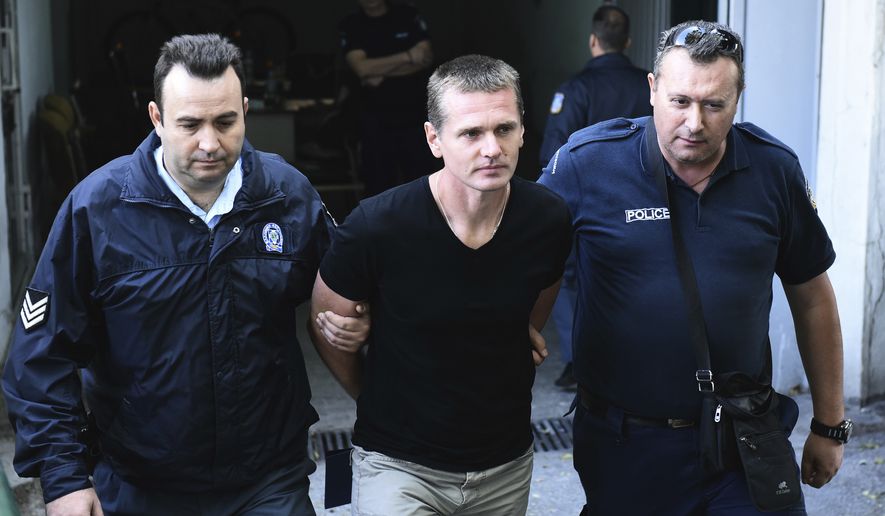The alleged Russian mastermind of a $4 billion digital money laundering scheme sits in an Athens prison cell as Washington and Moscow “fight over his brain,” according to international illicit finance analysts.
In July, a joint U.S.-Interpol task force arrested Alexander Vinnik in a remote Greek beachside village, but the man suspected of being the world’s highest-profile financial cybercriminal has denied all charges against him.
But in a behind-the-scenes extradition drama last week that observers say recalls Cold War intrigue over cryptology, Russian and U.S. officials scrambled in a diplomatic fight for the mysterious 37-year-old’s secrets.
American authorities seek to bring Mr. Vinnik from Greece to the U.S. to learn how he might have worked his schemes, who his partners might have been and, most important, whose money he might have helped hide. Russia, however, would rather get Mr. Vinnik to Moscow to keep his innovative tactics and network to themselves.
“Everyone is worrying about the unknowns,” said Boris Zilberman, a Russia analyst with the Foundation for the Defense of Democracies. “And the murkiest questions is — the $4 billion that he was laundering — who and what were involved? If you’re taking the more conspiratorial viewpoint, you ask, are the Russians afraid of Vinnik turning that information over to the U.S.?”
Add to the mix the strained geopolitics between Washington and Moscow over Russia’s ever-expanding cyberwar capabilities. Across Capitol Hill, where multiple probes explore suspected Kremlin efforts to influence the U.S. presidential election, concerns about Russia — especially when it comes to the internet — are at an all-time-high.
The Vinnik case also features anxiety about the shadowy digital currency known as bitcoin, which Mr. Vinnik is suspected of using to host an online exchange where all manner of crimes were committed anonymously.
According to the 21-count indictment from the U.S. attorney’s office in the Northern District of California, the Russian has been accused of facilitating crimes including drug trafficking, public corruption, hacking, fraud, identity theft and tax refund fraud — in addition to billions of dollars of money laundering through bitcoin accounts using an online exchange known as BTC-e.
America’s defense and intelligence communities were so alarmed at surges in what appeared to be illegal bitcoin activity by terrorists, drug kingpins and white-collar criminals that they launched a wave of operations this year against Russian cybercriminals — an effort that included the capture of Mr. Vinnik.
Vacationing with his wife and two children at a beach, he was grabbed by more than 20 agents who swarmed in after months of investigative work that the FBI called “highly complex” and involved a who’s who of U.S. law enforcement, including Immigration and Customs Enforcement, Homeland Security Investigations, the FBI, the FDIC, the Secret Service and the U.S. Treasury’s Financial Crimes Enforcement Network.
Mr. Vinnik is one of seven Russians who have been arrested or indicted worldwide this year on U.S. cybercrime charges.
Analysts point to another factor: Mr. Vinnik’s stature as possibly the most brilliant bitcoin criminal ever captured. The anonymous digital currency, which is not backed by any country or recognized by international banks, is young — less than a decade old — and the space it has carved out across the internet is chaotic, ungoverned and largely uncharted.
U.S. cyberintelligence analysts have told The Washington Times that the Pentagon is conducting experiments at the highest levels to see how bitcoin-related technology could be harnessed for America’s military advantage.
Mr. Vinnik’s wife said politics are at play in his extradition case.
In an interview last month with RT, the Russian international TV station that U.S. intelligence calls ’a Kremlin propaganda mouthpiece,’ Mrs. Vinnik said the U.S. wants her husband “because of his knowledge, because of his intellectual abilities above all.” She reportedly travels to Greece regularly to bring him clothes at the Thessaloniki prison. She also maintains he was merely a skilled cryptocurrency consultant.
In an RT phone interview from prison, Mr. Vinnik echoed his innocence. “I found out about the accusations only a month after I was arrested,” he said through his attorney.
Last week, when an Athens court ruled in favor of the U.S. on the extradition request, Mr. Vinnik’s attorneys appealed to the Greek supreme court. Russia’s foreign ministry sharply criticized the ruling and still hopes to extradite him to Moscow.
In Washington, the case has Mr. Zilberman’s attention because bitcoin and bitcoin-related technologies mean there could be little actual evidence.
“[Mr. Vinnik’s] only bargaining chip is to turn over what he knows,” Mr. Zilberman said. “And nobody knows what he could say. Was he a purely a lone actor? Does he know the wider chart of people involved across these currency spaces conducting this type of behavior? Can he flip on others?”
A photo of Mr. Vinnik entering the Athens court last month showed him unshaven and wearing the same brand of T-shirt as the two special agents escorting him. They were also unshaven.
Anyone familiar with the extradition business or major money laundering cases would explain that the three men tried to look similar to make an assassination attempt harder.
“Four billion dollars is a lot of money,” Mr. Zilberman said.
• Dan Boylan can be reached at dboylan@washingtontimes.com.




Please read our comment policy before commenting.